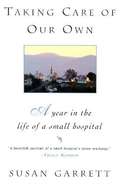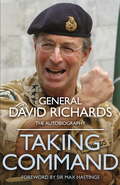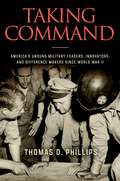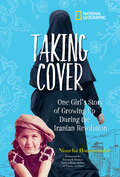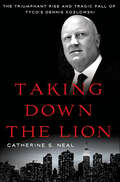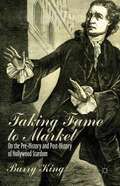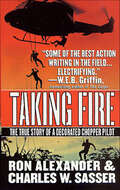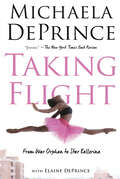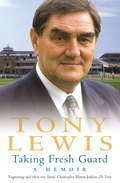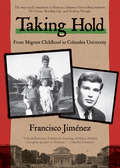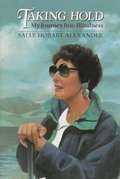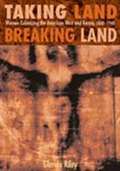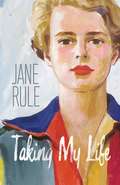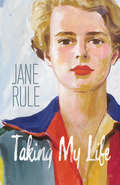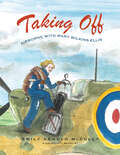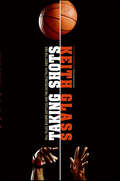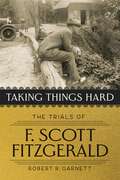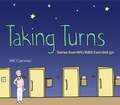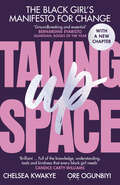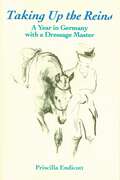- Table View
- List View
Taking Back My Power: Our Bodies. Our Consent.
by Georgia HarrisonGeorgia Harrison's story as you've never heard it before. Explosive and inspiring, Georgia reveals the shocking truth of how she suffered revenge porn at the hands of her ex - and how she fought to get her life back. 'One woman's campaign for justice for herself and for all victims of image-based sexual abuse. Georgia writes with unflinching honesty and, perhaps most powerfully, with hope' ELIZABETH DAY'Georgia has been so brave. A total inspiration. Everyone should read this book' EM CLARKSON'Rousing and important ... A much-needed manifesto on consent' StylistIn 2020, Georgia Harrison's ex-boyfriend Stephen Bear shared intimate footage of her online without her consent. With the click of a button, Georgia's innocence and dignity were stolen. But now she's taking her power back. This is not a sad story - it's a story about the power of hope, a journey to justice, and a rallying cry for change.In court, Georgia was finally allowed to tell her side of the story - and Bear was found guilty of revenge porn and voyeurism in what became the most talked-about case in the British media. This culminated in a 21-month jail sentence, a ruling that has cemented Georgia as a feminist icon.This is Georgia's story like you've never heard it before. Unfiltered and unflinching, Georgia pulls back the curtain on the nightmare that could have crushed her, but that made her who she is today. Georgia is proud to be a voice for women, determined to help victims of image-based sexual abuse seek justice. Holding nothing back, she shines a light on how to navigate traumatic times - the importance of hope, building resilience and a positive mindset. Taking Back My Power is more than just a memoir; it's an entire movement.
Taking Care of Our Own: A Year in the Life of a Small Hospital
by Susan GarrettGarrett's compelling depiction of the hospital in York, Maine, that she administered for six years becomes her occasion to examine what she terms the "fix" today's medical practitioners find themselves in. Noting that market competition has not contained medical costs, she shows us the turf battles within the system as her not-for-profit hospital attempts to reinvent itself to survive. What services should be added to compete in the hospital marketplace? Contract for a traveling CAT scanner owned by a for-profit firm? Institute a cardiology lab, a market niche? The 79-bed, 80-year-old York Hospital is vexed by its perceived mandate to take care of its own. Along with the affluent summer folk, the hospital's "neighbors" include the likes of homeless Tim Bailey, who turns up with chest pains each Christmas Eve and is hospitalized so he needn't be alone for the holidays; Elizabeth Littlejohn, a 19-year-old bulimic with a hospital bill of $76,000, who defaults on her $10 monthly payments and whose dirt-poor family has looked to York Hospital for social services for three generations. As Garrett ruminates on what hospitals should contribute to their communities, she vivifies the daily happenings at her own. And if she doesn't have ready answers, Garrett, who is now a freelance writer, makes us ponder the price of valuing too highly the cold logic of cost-benefit analysis.
Taking Command
by David RichardsGeneral Sir David Richards is one of the best known British generals of modern times. In 2013 he retired after over forty years of service in the British Army and a career that had seen him rise from junior officer with 20 Commando to Chief of the Defence Staff, the professional head of the British Armed Forces.He served in the Far East, Germany, Northern Ireland and East Timor. He was the last Governor of Berlin's Spandau Prison, when Rudolf Hess, Hitler's deputy, was its sole prisoner. In 2005 he was appointed Commander of the Allied Rapid Reaction Corps in Afghanistan and as commander of NATO forces became the first British General to command US Forces in combat since the Second World War.In 2000, Richards won acclaim when he brought together a collation of forces in Sierra Leone to stop the ultra-violent Revolutionary United Front from attacking the capital, Freetown. In so doing he ended one of the bloodiest civil wars to bedevil the region. He did so without the official sanction of London, and failure could have cost him his career.As Chief of the Defence Staff he advised the government during the crises and interventions in Libya and Syria and oversaw the controversial Strategic Defence and Security Review.Taking Command is Richards' characteristically outspoken account of a career that took him into the highest echelons of military command and politics. Written with candour, and often humour, his story reflects the changing reality of life for the modern soldier over the last forty years and offers unprecedented insight into the readiness of our military to tackle the threats and challenges we face today.
Taking Command
by General Sir David RichardsGeneral Sir David Richards is one of the best known British generals of modern times. In 2013 he retired after over forty years of service in the British Army and a career that had seen him rise from junior officer with 20 Commando to Chief of the Defence Staff, the professional head of the British Armed Forces.He served in the Far East, Germany, Northern Ireland and East Timor. He was the last Governor of Berlin's Spandau Prison, when Rudolf Hess, Hitler's deputy, was its sole prisoner. In 2005 he was appointed Commander of the Allied Rapid Reaction Corps in Afghanistan and as commander of NATO forces became the first British General to command US Forces in combat since the Second World War.In 2000, Richards won acclaim when he brought together a collation of forces in Sierra Leone to stop the ultra-violent Revolutionary United Front from attacking the capital, Freetown. In so doing he ended one of the bloodiest civil wars to bedevil the region. He did so without the official sanction of London, and failure could have cost him his career.As Chief of the Defence Staff he advised the government during the crises and interventions in Libya and Syria and oversaw the controversial Strategic Defence and Security Review.Taking Command is Richards' characteristically outspoken account of a career that took him into the highest echelons of military command and politics. Written with candour, and often humour, his story reflects the changing reality of life for the modern soldier over the last forty years and offers unprecedented insight into the readiness of our military to tackle the threats and challenges we face today.
Taking Command: America's Unsung Military Leaders, Innovators, and Difference Makers Since World War II
by Thomas D. PhillipsBeyond the pantheon of Patton, Eisenhower, MacArthur, and Nimitz lies an untold story of military genius — the innovative commanders who stepped from their shadows to shape modern warfare from the Cold War to the War on Terror. From the general who made the impossible Berlin Airlift succeed to the mastermind behind the raid that killed Osama bin Laden, Taking Command unveils the remarkable stories of twenty-four unsung military leaders who transformed America's fighting forces. These commanders didn't just execute orders— they revolutionized warfare through innovation, unconventional thinking, and sheer determination. Through portraits of these exceptional leaders, readers will discover: How "Tonnage Tunner" moved 1.8 million tons of supplies during the Berlin Airlift The Marine general whose controversial Vietnam tactics cost him his career but proved prescient How Admiral McRaven's leadership principles extend far beyond his famous "make your bed" speech The untold story behind the "Be All You Can Be" commander who later led the Panama invasion Written by retired Air Force veteran Thomas Phillips, this compelling narrative serves both as a vital missing chapter in American military history and a masterclass in leadership under pressure. For anyone fascinated by military strategy or seeking to understand the qualities of exceptional leadership, Taking Command offers unprecedented access to the minds of America's most innovative military commanders.
Taking Cover: One Girl's Story of Growing Up During the Iranian Revolution
by Nioucha HomayoonfarThis coming-of-age memoir, set during the Iranian Revolution, tells the true story of a young girl who moves to Tehran from the U.S. and has to adjust to living in a new country, learning a new language, and starting a new school during one of the most turbulent periods in Iran's history.When five-year-old Nioucha Homayoonfar moves from the U.S. to Iran in 1976, its open society means a life with dancing, women's rights, and other freedoms. But soon the revolution erupts and the rules of life in Iran change. Religion classes become mandatory. Nioucha has to cover her head and wear robes. Opinions at school are not welcome. Her cousin is captured and tortured after he is caught trying to leave the country. And yet, in the midst of so much change and challenge, Nioucha is still just a girl who wants to play with her friends, please her parents, listen to pop music, and, eventually, have a boyfriend. Will she ever get used to this new culture? Can she break the rules without consequences? Nioucha's story sheds light on the timely conversation about religious, political, and social freedom, publishing in time for the 40th anniversary of the Iranian Revolution.
Taking Down the Lion: The Triumphant Rise and Tragic Fall of Tyco's Dennis Kozlowski
by Catherine S. NealTaking Down the Lion offers an inside look at the career of Tyco's most infamous CEO, and what exactly brought him down so publicly.As the widely-admired CEO of Tyco International, Dennis Kozlowski grew a little-known New Hampshire conglomerate into a global giant. In a stunning series of events, Kozlowski suddenly lost his job along with his favored public status when he was indicted by legendary Manhattan DA Robert Morgenthau—it was an inglorious end to an otherwise brilliant career. Kozlowski was the face of corporate excess in the turbulent post-Enron environment; he was pictured under headlines that read "Oink Oink," and publicly castigated for his extravagant lifestyle. "Deal-a-Day Dennis" was transformed into the "poster child for corporate greed." Kozlowski was ultimately convicted of grand larceny and other crimes that, in sum, found the former CEO guilty of wrongfully taking $100 million from Tyco.Taking Down the Lion shines a bright light on former CEO Dennis Kozlowski and the Tyco corporate scandal—it is the definitive telling of a largely misunderstood episode in U.S. business history. In an unfiltered view of corporate America, Catherine S. Neal pulls back the curtain to reveal a world of big business, ambition, money, and an epidemic of questionable ethics that infected not only business dealings but extended to attorneys, journalists, politicians, and the criminal justice system. When the ugly truth is told, it's clear the "good guys" were not all good and the "bad guys" not all bad. And there were absolutely no heroes.
Taking Fame to Market
by Barry KingThis book explores, from a sociological perspective, the relationship between acting as symbolic work and the commercialization of popular culture. Particular attention is paid to the social conditions that gave rise to stardom in the theatre and cinema, and how shifts in the marketing of stars have impacted upon contemporary celebrity culture.
Taking Fire: The True Story of a Decorated Chopper Pilot
by Charles W. Sasser Ron AlexanderTaking Fire is the incredible memoir by one of the most decorated chopper pilots to emerge from the Vietnam War. Nicknamed "Mini-Man" for his diminutive stature, a mere five-foot-three and 125 pounds in his flight boots, chopper pilot Ron Alexander proved to be a giant in the eyes of the men he rescued from the jungles and paddies of Vietnam. With an unswerving concern for every American soldier trapped by enemy fire, and a fearlessness that became legendary, Ron Alexander earned enough official praise to become the second most decorated helicopter pilot of the Vietnam era. Yet, for Ron, the real reward came from plucking his fellow soldiers from harm's way, giving them another chance to get home alive.In Taking Fire, Alexander and acclaimed military writer Charles Sasser transport you right into the cramped cockpit of a Huey on patrol, offering a bird's eye view of the Vietnam conflict. Packed with riveting action and gritty "you-are-there" dialogue, this outstanding book celebrates the everyday heroism of the chopper pilots of Vietnam.
Taking Flight: From War Orphan to Star Ballerina
by Michaela Deprince Elaine DeprinceMichaela DePrince was known as girl Number 27 at the orphanage, where she was abandoned at a young age and tormented as a "devil child" for a skin condition that makes her skin appear spotted. But it was at the orphanage that Michaela would find a picture of a beautiful ballerina en pointe that would help change the course of her life. At the age of four, Michaela was adopted by an American family, who encouraged her love of dancing and enrolled her in classes. She went on to study at the Jacqueline Kennedy Onassis School at the American Ballet Theatre and is now the youngest principal dancer with the Dance Theatre of Harlem. She has appeared in the ballet documentary First Position, as well as on Dancing with the Stars, Good Morning America, and Nightline. In this engaging, moving, and unforgettable memoir, Michaela shares her dramatic journey from an orphan in West Africa to becoming one of ballet's most exciting rising stars.
Taking Flight: My Story
by Dan Gutman Vicki Van MeterThe autobiography of the young girl who learned to fly at age 10 and 2 years later piloted a plane across the Atlantic.
Taking Fresh Guard
by Tony LewisTony Lewis has reached the top of English cricket as a player captaining his country, as a commentator for the BBC, and as an administrator becoming President of the MCC. But even these bare outlines do not do justice to the full range of his career, as a musician, rugby player, head of the Welsh Tourist Board, and much else besides. In this memoir, Tony Lewis takes us through key episodes in his life, showing how chance moments have shaped much that followed. Written in a warm and lyrical style, this is a fascinating account of one man's remarkable life and of the sport he loves so much. He recalls the great characters he has met throughout his career, and gives his vision of a way forward for English cricket.
Taking Fresh Guard
by Tony LewisTony Lewis has reached the top of English cricket as a player captaining his country, as a commentator for the BBC, and as an administrator becoming President of the MCC. But even these bare outlines do not do justice to the full range of his career, as a musician, rugby player, head of the Welsh Tourist Board, and much else besides. In this memoir, Tony Lewis takes us through key episodes in his life, showing how chance moments have shaped much that followed. Written in a warm and lyrical style, this is a fascinating account of one man's remarkable life and of the sport he loves so much. He recalls the great characters he has met throughout his career, and gives his vision of a way forward for English cricket.
Taking Heat: The President, the Press, and My Years in the White House
by Ari FleischerThe early years of the twenty-first century were a tumultuous time in America. The country faced a hotly contested presidential election, the largest terrorist attack in the nation's history, and the early stages of war. Through it all, President George W. Bush surrounded himself with a handful of close advisers. During this time the man beside the President was Ari Fleischer, his press secretary and one of his most trusted confidants. In this role, Fleisher was present for every decision and became an eyewitness to history.In this riveting account, Fleischer goes behind the scenes as he recalls his experiences in the West Wing. Through the ups and downs of this time, he took the heat, fielded the questions, and brought the President's message into living rooms around the world.In Taking Heat, Fleischer, for the first time, gives his perspective on:The 2000 election, from the recounts to the transition to powerSeptember 11, 2001, its aftermath, and the anthrax scareThe pressure-filled buildup to the war in Iraq and the President's thoughts as the war beganLife in the White House, from learning to adjust to the pace of the West Wing and his early briefings to his relationship with the pressThe White House press corps, who they are, and how they report the newsThe factors that led to his decision to leave Washington behind.This is the story of the men and women of the White House press corps and the cornerstones of democracy: freedom of speech and the freedom of the press. Fleischer presents an in-depth, insider's view on the Washington political arena from a perspective few have seen.Fleischer writes of his belief that the press has a bias in Washington. It's not a question of partisanship or press-driven ideology. Instead, it's a focus on conflict, particularly if it's a conflict they can attach to the President. It's the nature of the White House press corps, regardless of who's in power. The members of the White House press corps are masters at being devil's advocate, able to take with passion the opposite side of whatever issue the President supports. Fleischer's job was to calmly field their questions, no matter how pointed.Taking Heat is an introspective exploration of the top political events in the first half of the Bush administration, as well as the candid observations of a professional who stood in the bright lights of the world stage.
Taking Hold
by Francisco JiménezIn this fourth book in his award-winning memoir series, Francisco Jimenez leaves everything behind in California--a loving family, a devoted girlfriend, and the culture that shaped him-- to attend Columbia University in New York City. With few true accounts of the Latino experience in America, Francisco Jimenez's work comes alive with telling details about the warmth and resiliency of family and the quest for identity against seemingly impossible odds. "Many [students] have commented that your books give them hope and courage and, thanks to you, many are seriously thinking about college for the first time in their lives" --John Padula, teacher, Boston Public Schools
Taking Hold: My Journey into Blindness
by Sally Hobart AlexanderA true story of the author's loss of vision as a young woman and of her adaptation to blindness.
Taking Land, Breaking Land: Women Colonizing the American West and Kenya, 1840-1940
by Glenda RileyIn spite of considerable similarities, the American West and Kenya have rarely been compared or contrasted by historians, until now. This book examines the lives of women colonists on the American and Kenyan frontiers to demonstrate the importance of gender and race in shaping women's frontier experience. Although the West and Kenya are half a world apart, have natives of different races, and developed at different periods, the lives of women colonists show remarkable parallels. On both frontiers, white women were active agents of colonial conquest. They believed in the necessity of imposing their culture upon native peoples to bring about 'civilisation'. In turn, the colonised responded by resisting, which meant that women of colour seldom allied with white women. Riley's discussion of the historical experiences of these two frontiers addresses such crucial issues as women's roles in the continuation of colonisation in the US West as opposed to their roles in its collapse in Kenya. Although she uses post-modern theoretical concepts of self and other, of resistance and adaptation, her writing will appeal to a broad audience of students, scholars, and general readers.
Taking My Life
by Jane RuleDiscovered in her papers as a handwritten manuscript in 2008, Jane Rule's autobiography is a rich and culturally significant document that follows the first twenty-one years of her life. In writing about her formative years, she is indeed "taking" the measure of her life, assessing its contours of pleasure and pain, and accounting precisely for how it evolved, with great discretion and consideration for those who might have been affected by being represented in her work. She appreciated the ambiguity of the title she chose, with all its implications of suicide: at the end of her writing life, she was submitting herself as a person, not only to the literary and cultural, but also the moral and ethical critique of her readers. At turns deeply moving and witty,Taking My Lifeprobes in emotional and intellectual terms the larger philosophical questions that were to preoccupy her throughout her literary career, and showcases the origins and contexts that gave shape to Rule's rich intellectual life. Her autobiography will appeal to avid followers of her work, delighted to discover another of her works that has, until now, remained unpublished.
Taking My Life
by Jane Rule Linda MorraDiscovered in her papers as a handwritten manuscript in 2008, Jane Rule's autobiography is a rich and culturally significant document that follows the first twenty-one years of her life.In writing about her formative years, she is indeed "taking" the measure of her life, assessing its contours of pleasure and pain, and accounting precisely for how it evolved, with great discretion and consideration for those who might have been affected by being represented in her work. She appreciated the ambiguity of the title she chose, with all its implications of suicide: at the end of her writing life, she was submitting herself as a person, not only to the literary and cultural, but also the moral and ethical critique of her readers.At turns deeply moving and witty, Taking My Life probes in emotional and intellectual terms the larger philosophical questions that were to preoccupy her throughout her literary career, and showcases the origins and contexts that gave shape to Rule's rich intellectual life. Her autobiography will appeal to avid followers of her work, delighted to discover another of her works that has, until now, remained unpublished.
Taking Off: Airborne With Mary Wilkins Ellis
by Emily Arnold McCullyWitness the true story of how Mary Wilkins Ellis’ childhood passion for flying led to an exciting career in the air, written and illustrated by a Caldecott Medalist. <p><p> As a child, Mary Wilkins Ellis longed to fly, but she had to wait until she was 16 before she could have her first lesson. She soon became the youngest licensed pilot in her English county, but then all civilian flight was banned when Germany launched its attacks on Britain in 1940. Mary was grounded. <p><p> One day she chanced to hear a radio appeal for Britons with pilot’s licenses—even women—to join the Air Transport Auxiliary and ferry brand new fighter planes to Royal Air Force bases. Mary immediately applied, and spent the rest of the war delivering hundreds of different kinds of aircraft—most of which she’d never flown before—forming lifelong bonds with her colleagues, surviving many a close call, and helping to save her country from destruction. <p><p> After the war she became a flight instructor, ran an air taxi service, then managed an airfield, the only woman in Europe to do so. In her spare time, she won rallies in her racing car. Mary’s childhood dream became a thrilling lifetime aloft, lasting until she died at 101. <p><p> With watercolor and ink illustrations which perfectly capture the exhilaration of flying, Taking Off brings this little-known figure and her can-do spirit to life. <p><p> Extensive material in the back of the book includes additional information about Mary Wilkins Ellis and the Airport Transport Auxiliary, as well as sources. <P><P><i>Advisory: Bookshare has learned that this book offers only partial accessibility. We have kept it in the collection because it is useful for some of our members. Benetech is actively working on projects to improve accessibility issues such as these.</i>
Taking Shots: Tall Tales, Bizarre Battles, and the Incredible Truth About the NBA
by Keith GlassBring a family of four to an NBA game today, and it costs around $500 to watch a bunch of seven-footers take bad shots. Perhaps the quote often attributed to P.T. Barnum is true—there really is a sucker born every minute.The NBA is in trouble. And as NBA agent Keith Glass describes it—he's part of the problem! If team owners are willing to throw millions of dollars his way for marginal players, why should he be the only one with the self-restraint to say "no"?In his insightful, funny, and often mind-numbingly bizarre tales of life in the NBA over the last twenty- five years, Keith Glass lets it fly from half-court. He'll tell you how we got to the present state—where an agent who makes millions off the game can't sit through one; why our NBA stars couldn't capture Olympic gold; and why the game he loves is in dire need of help.Glass has seen it all as the representative of players like Mark Eaton, the seven-foot-five center found working as a mechanic because he hated basketball; Mahmoud Abdul-Rauf, who converted to Islam and brought the wrath of the league upon him when he refused to stand for the National Anthem; and first-round draft pick Quincy Douby, who was forced to enter the draft before graduating from Rutgers because of the harsh NCAA rules regarding college eligibility.With informative chapters such as "How to Feed Your Family on Only $14 Million a Year," "Eighty-one Feet of White Centers," and "From 6'11" to the 7- Eleven," Glass shatters the myth of NBA marketing: that everything about the game is great, and that as long as the fans in the luxury boxes are happy and weighed down with expensive merchandise, all is well. But have no fear! Keith Glass doesn't preach about the evils of highlight film slam-dunks—he'll just have you falling down laughing as he flagrantly fouls the league that was once the envy of the pro sports world.
Taking Things Hard: The Trials of F. Scott Fitzgerald
by Robert GarnettF. Scott Fitzgerald published America’s favorite novel, The Great Gatsby, at the young age of twenty-eight. Despite this extraordinary early achievement, Fitzgerald finished just one novel in the next (and last) fifteen years of his life, ending as a mostly unemployed Hollywood screenwriter. Taking Things Hard reveals the story behind the now-iconic Gatsby, along with Fitzgerald’s struggle to write anything that matched its brilliance. Robert R. Garnett’s new biographical study of Fitzgerald’s life and work begins by constructing a portrait of the young man who would wholly and uniquely pour himself into writing Gatsby. In the years following its publication, Fitzgerald continued penning stories, some of them among his finest, yet it took him nine years to complete another novel. The downward trajectory of his career had interweaving causes, among them arrogance, irresponsibility, his troubled marriage to Zelda Sayre, financial improvidence, and a destructive alcoholism. At the root of it all, though, lingered the simple fact that Fitzgerald’s most intense and profound experiences had come early, during his truncated undergraduate years at Princeton and the months following his February 1919 discharge from the army. Taking Things Hard provides a fresh look at the imaginative sources of Fitzgerald’s fiction and considers the elements, drawn from the keen impressions and salient emotions of its author’s youth, that make Gatsby a book that still speaks powerfully to readers.
Taking Turns: Stories from HIV/AIDS Care Unit 371 (Graphic Medicine #8)
by Mk CzerwiecIn 1994, at the height of the AIDS epidemic in the United States, MK Czerwiec took her first nursing job, at Illinois Masonic Medical Center in Chicago, as part of the caregiving staff of HIV/AIDS Care Unit 371. Taking Turns pulls back the curtain on life in the ward.A shining example of excellence in the treatment and care of patients, Unit 371 was a community for thousands of patients and families affected by HIV and AIDS and the people who cared for them. This graphic novel combines Czerwiec’s memories with the oral histories of patients, family members, and staff. It depicts life and death in the ward, the ways the unit affected and informed those who passed through it, and how many look back on their time there today. Czerwiec joined Unit 371 at a pivotal time in the history of AIDS: deaths from the syndrome in the Midwest peaked in 1995 and then dropped drastically in the following years, with the release of antiretroviral protease inhibitors. This positive turn of events led to a decline in patient populations and, ultimately, to the closure of Unit 371. Czerwiec’s restrained, inviting drawing style and carefully considered narrative examine individual, institutional, and community responses to the AIDS epidemic—as well as the role that art can play in the grieving process.Deeply personal yet made up of many voices, this history of daily life in a unique AIDS care unit is an open, honest look at suffering, grief, and hope among a community of medical professionals and patients at the heart of the epidemic.
Taking Up Space: The Black Girl’s Manifesto for Change
by Chelsea Kwakye Ore Ogunbiyi'Brilliant' CANDICE CARTY-WILLIAMS, author of QUEENIE'Essential' BERNARDINE EVARISTO, author of GIRL, WOMAN, OTHER'Hugely important' PAULA AKPAN____________________________As a minority in a predominantly white institution, taking up space is an act of resistance. Recent Cambridge grads Chelsea and Ore experienced this first-hand, and wrote Taking Up Space as a guide and a manifesto for change.FOR BLACK GIRLS:Understand that your journey is unique. Use this book as a guide. Our wish for you is that you read this and feel empowered, comforted and validated in every emotion you experience, or decision that you make.FOR EVERYONE ELSE:We can only hope that reading this helps you to be a better friend, parent, sibling or teacher to black girls living through what we did. It's time we stepped away from seeing this as a problem that black people are charged with solving on their own.It's a collective effort.And everyone has a role to play.Featuring honest conversations with students past and present, Taking Up Space goes beyond the buzzwords of diversity and inclusion and explores what those words truly mean for young black girls today.____________________________#Merky Books was set up by publishers Penguin Random House and Stormzy in June 2018 to find and publish the best writers of a new generation and to publish the stories that are not being heard. #Merky Books aims to open up the world of publishing, and this year has launched a New Writer's Prize and will soon be launching a #Merky Books traineeship. 'I know too many talented writers that don't always have an outlet or a means to get their work seen, and hopefully #Merky Books can now be a reference point for them to say "I can be an author", and for that to be a realistic and achievable goal... Reading and writing as a kid were integral to where I am today and I, from the bottom of my heart, cannot wait to hear your stories and get them out into the big wide world.'STORMZY
Taking Up the Reins
by Priscilla EndicottA charming and honest first-hand account, behind-the-scenes look at what dressage training abroad entails. In this personal memoir, the author chronicles the year she spent in Germany studying with the great dressage master Walter Christensen.

